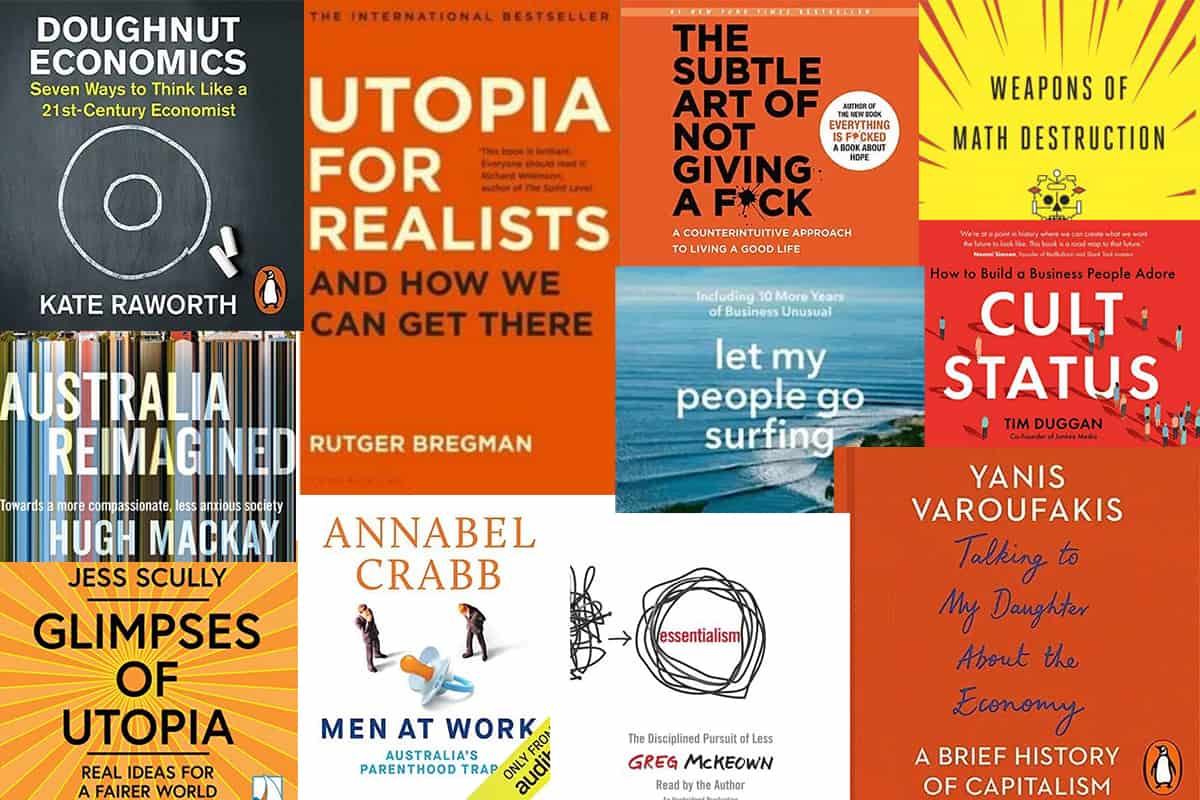2020. What a year.
If Bill Gates can do it, why can’t I?
I try and get a good walk in every day. Podcasts were my thing for a long time, but through 2020 I started to really dive into audiobooks a lot more. Also the paper ones, but mainly audiobooks. I was chatting with a client about this the other day and she said she’d done the same thing – moved more from podcasts into audiobooks. We agreed it was due to the information overload you can get from podcasts sometimes. And also the grounding nature of a book. Having the same book to listen to on your daily walk in the middle of stage 4 lockdown gives some sort of grounding I suppose.
There’s no fiction listed here – all of my 2020 faves are non-fiction.
The common themes here are societal equality and sustainability. The concepts of Universal Basic Income (UBI) and similar schemes come up a lot.
I’ve always been reasonably political, and through 2020 I found myself getting more interested in politics, and this is reflected in my reading choices for this year.
It started with the fires. There was the inescapable pandemic that we’re still in. And on it went.
Australia Reimagined: Towards a More Compassionate, Less Anxious Society - Hugh Mackay (2018)
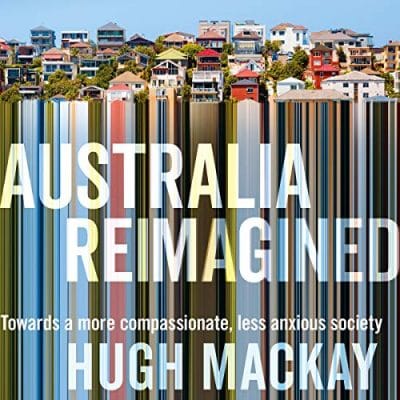
Australia Reimagined: Towards a More Compassionate, Less Anxious Society” by Hugh Mackay is a thought-provoking exploration of the societal landscape in Australia, offering a compelling vision for a more compassionate and less anxious future.
Through a lens of compassion, Mackay addresses issues such as individualism, social fragmentation, and the erosion of community bonds, providing a roadmap for fostering connections and empathy in a rapidly changing world.
As a personal note, I started listening to the audiobook version of this as we drove from Shoalhaven to Canberra at the end of December 2019 following a family Christmas at Culburra Beach. The constant smell of bushfires and cinders raining from the sky will no doubt be etched in our memories for a long time.
As I listened to this book over the next few weeks, I got angrier at the state of our political system and the individualist nature of our current federal government (and the majority of those who voted for it).
In my mind, the bushfire crisis lies solely on the hands of the climate deniers and those whose individualist ideology puts their personal wellbeing above those of everyone else. This book offers solutions to the individualist crisis that we have found ourselves in.
Cult Status: How to Build a Business People Adore - Tim Duggan (2020)

Cult Status doesn’t just offer an excellent read; it’s genuinely inspiring.
Tim Duggan draws from real-life examples and imparts wisdom from entrepreneurs, ensuring the content remains relatable, enjoyable, and grounded in practicality. The book acknowledges the evolving nature of consumer behaviour and underscores the importance for businesses to adopt principles that are purposeful and creative.
By showcasing the mindset of the next generation of entrepreneurs, Duggan illustrates how embracing this new way of thinking can lead to business success. Whether you’re a seasoned entrepreneur or just embarking on the journey, Cult Status stands out as a valuable guide that not only provides practical insights but also encourages a fresh perspective on entrepreneurship in today’s business landscape. The exercises throughout the book are fabulous and very useful.
I recommend this book to many of my students who are thinking of starting a business.
Glimpses of Utopia: Real Ideas for a Fairer World - Jess Scully (2020)
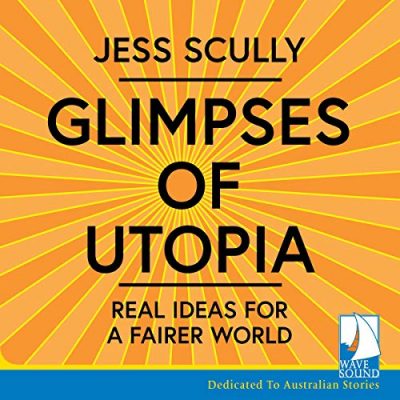
“Glimpses of Utopia: Real Ideas for a Fairer World” by Jess Scully has been one of the most uplifting and insightful reads for me this year.
This book doesn’t just lay out the problems our world faces but offers realistic alternatives and solutions. As someone who often feels overwhelmed by the enormity of global issues, Scully’s approach has been a refreshing beacon of hope for the future.
2020’s theme for me certainly seems to be societal equality and sustainability and this book covers these areas well. The exploration of concepts like Universal Basic Income (UBI), Univeral Basic Services (UBS) community participation in governance, and increased funding for crucial industries such as health, education, and social services lays the groundwork for a more equitable society.
In a year marked by the challenges of COVID, this book couldn’t have come at a better time. It’s a brilliantly researched source of hope and call to action.
Essentialism: The Disciplined Pursuit of Less - Greg McKeown (2015)

“Essentialism: The Disciplined Pursuit of Less” was a well-timed discovery, as I started listening to this throughout the second lockdown here in Melbourne. A lot was going on and I really needed a book like this to ground where I was at. To sort out what needed to be done now, and what didn’t.
The book advocates for simplifying one’s life by focusing on what truly matters. The central idea is that by concentrating on the essential and eliminating the non-essential, individuals can lead more fulfilling and purposeful lives.
“Essentialism” encourages individuals to follow the principles of less but better, making choices that align with their core values, and learning to say no to non-essential commitments. The book emphasises that by doing so, people can achieve more meaningful results and lead more purpose-driven lives, as demonstrated by the examples of successful individuals and organisations who have embraced essentialism.
Honourable mention should go here for James Clear’s Atomic Habits. These books cross over a fair bit, and both are excellent. If you’ve not read either, I recommend both, although I found Essentialism to be the most engaging and useful of the two.
Let My People Go Surfing: The Education of a Reluctant Businessman - Yvon Chouinard (2016)
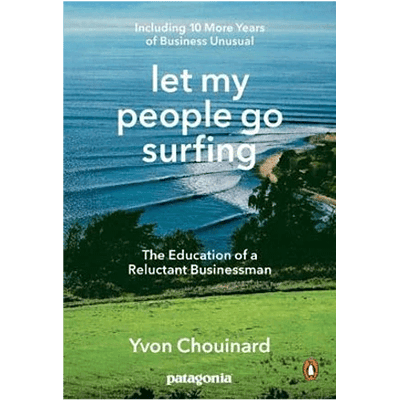
As a lecturer in fashion marketing and a small business owner, “Let My People Go Surfing” stands out as one of the finest business books I’ve read in a while. While the initial enthusiasm may border on hyperbole, delving into the narrative reveals an inspiring tale of a business with unwavering ethics.
Yvon Chouinard, the founder of Patagonia, blends memoir and business philosophy in this book, offering a distinctive perspective regarding environmental responsibility in business. His commitment to sustainability is evident in Patagonia’s practices, from utilising recycled materials to championing environmental causes.
Chouinard also advocates for a unique work-life balance, emphasising the significance of granting employees the freedom to pursue their passions. The “Let My People Go Surfing” policy at Patagonia, permitting staff to take time off for outdoor activities, serves as a testament to this philosophy.
Chouinard’s anecdotes underscore the potential for businesses to be both profitable and environmentally responsible, while also fostering a fulfilling work-life balance for employees.
The book goes beyond its sustainability focus, shedding light on the influential role Patagonia played in shaping workplace laws in the U.S., from sustainability initiatives to parental leave entitlements. For aspiring entrepreneurs, this book is a must-read.
Beyond its socially conscious and sustainable themes, the book also discussed the powerful idea that the path to mastery, irrespective of one’s level, lies in the pursuit of simplicity.
Weapons of Math Destruction: How Big Data Increases Inequality and Threatens Democracy - Cathy O'Neil (2017)
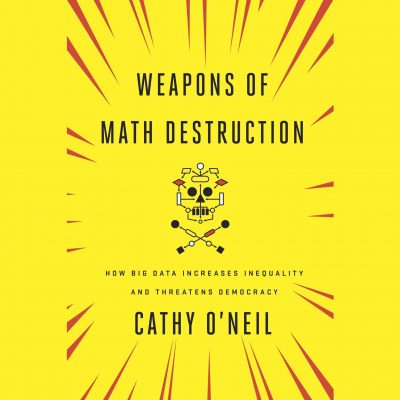
In “Weapons of Math Destruction,” Cathy O’Neil delves into thought-provoking examples and critical exploration of the broader implications of algorithmic decision-making in various aspects of society.
One striking example is the use of predictive policing algorithms, envisioning a futuristic scenario where computer programs replace traditional police officers to predict crime hotspots. While this might initially appear as a high-tech solution to crime prevention, O’Neil uncovers a troubling reality – these algorithms tend to unintentionally target specific neighbourhoods or demographics, resulting in a detrimental cycle of over-policing and deepening social inequality.
The book extends its exploration to issues like the impact of predictive modelling in the job market. O’Neil vividly paints a picture where job applications are analysed and judged by an algorithm, instead of a human. These algorithms, often relying on historical data, risk perpetuating biases, showing favouritism to applicants from prestigious universities and inadvertently disadvantaging those who couldn’t attend such institutions. This digital iteration of the classic ‘who you know’ problem becomes a powerful illustration of how algorithmic decisions can entrench social stratification.
“Weapons of Math Destruction” serves as a compelling critique of these algorithms, emphasising their potential to harm and reinforce inequality. O’Neil calls for greater transparency and accountability in the use of algorithms, advocating for responsible, ethical, and inclusive data practices.
The book stands as a powerful call to ensure that technology serves the common good rather than perpetuating injustice in our increasingly algorithm-driven world.
Talking to My Daughter About the Economy: A Brief History of Capitalism - Yanis Varoufakis (2017)

“Talking to My Daughter About the Economy” is a captivating read that translates intricate economic ideas into relatable stories. Through personal anecdotes, Yanis Varoufakis (former Greek Finance Minister) breaks down complex economic theories into digestible narratives.
Varoufakis uses everyday scenarios, such as discussing household chores to explain broader economic principles. By relating economic decisions to familiar experiences, like dividing tasks within a family, he makes the subject matter accessible and engaging. The book’s strength lies in its ability to make readers reflect on their own lives while learning about economics.
Utopia for Realists - Rutger Bregman (2017)
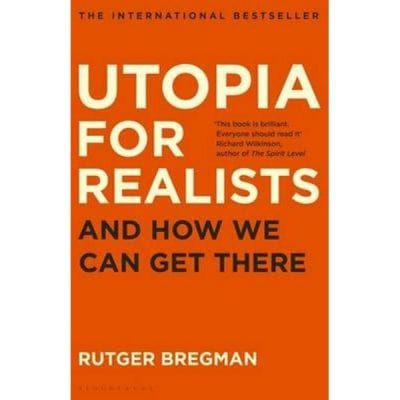
During Melbourne’s COVID-19 lockdowns, Rutger Bregman’s “Utopia for Realists” resonated with me as I grappled with the challenges of isolation and uncertainty. The book’s visionary ideas, such as the universal basic income (UBI) and shorter workweeks, felt particularly relevant.
Australia’s JobKeeper program did offer a real-world example of income support during the pandemic. It underscored the importance of reimagining our social and economic systems to prioritise the well-being of individuals, especially during times of crisis, like the COVID-19 lockdowns.
Bregman’s discussions on UBI and examples from UBI experiments around the world, like the one in Finland, provided a practical foundation for his visionary ideas. The success of these experiments highlighted how providing citizens with a regular unconditional income could not only ease financial stress but also enable individuals to pursue more meaningful work and personal growth.
Doughnut Economics: Seven Ways to Think Like a 21st-Century Economist - Kate Raworth (2018)
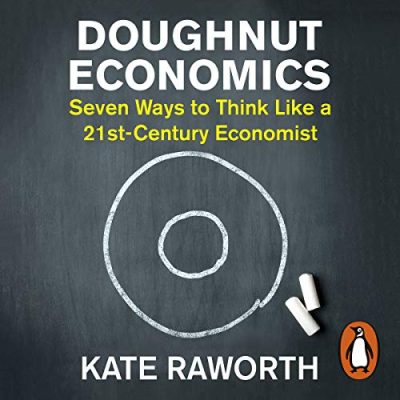
“Doughnut Economics” by Kate Raworth introduces a new economic model that envisions a “doughnut” shape, where the inner ring represents the basic needs of people, and the outer ring represents the ecological limits of our planet. The model’s central idea is to create a sustainable and equitable economy that balances the well-being of humanity with the health of the planet.
“Doughnut Economics” challenges traditional economic thinking, encouraging a shift in focus from GDP growth to well-being, equality, and environmental sustainability. The goal is to create an economic system that ensures everyone’s basic needs are met while staying within the planet’s ecological limits. The book provides a holistic and transformative perspective on how we can reshape economics to better serve both people and the planet.
Men at Work: Australia's Parenthood Trap - Annabel Crabb (2019)
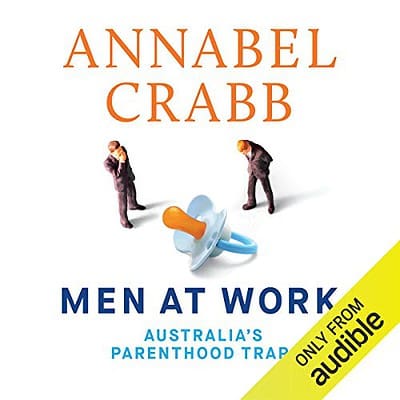
“Men at Work: Australia’s Parenthood Trap” by Annabel Crabb delves into the culture of paternity leave in Australia, offering an enlightening exploration that goes beyond policy discussions. Crabb skillfully dissects deep-rooted societal norms perpetuating gender imbalances in parenting and calls for the deconstruction of the patriarchy to facilitate meaningful change.
Seamlessly integrating insights from her prior work, “The Wife Drought,” she comprehensively examines why many men don’t see parenting as a shared responsibility, leaving women burdened with childcare responsibilities. The core line of the book is that the patriarchy is making it harder for both sexes – that in some ways, men have to be the breadwinners because that’s what society expects.
Drawing from my own experiences of paid paternity leave when our son was born, I can attest to the relevance and value of Crabb’s exploration, particularly in resonating with the disparities in attitudes towards paternal care. Even in official meetings, paternity leave was often referred to as ‘Daddy day-care’ and on my return to work when negotiating a gradual ease-in to full-time work, I was told by my manager “It’s 5 days or none.”
The Subtle Art of Not Giving a F*ck: A Counterintuitive Approach to Living a Good Life - Mark Manson (2016)
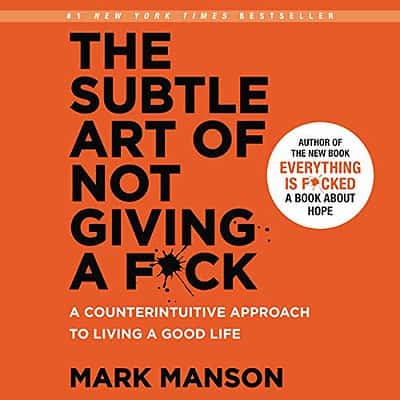
“The Subtle Art of Not Giving a F*ck” by Mark Manson is a book that encourages readers to embrace a more realistic and values-driven approach to life. Instead of pursuing endless positivity and avoiding discomfort, Manson suggests that we should focus on what truly matters to us and accept that adversity and discomfort are part of the human experience. This book is therapy.
Manson continually reflects on his own journey, including his early aspiration to become a rock star (something I can relate to), which ultimately failed (still relating to this). He shares the example of how his desire for fame and success without embracing the challenges and failures along the way left him unfulfilled. This personal anecdote serves as a powerful illustration of the book’s central message: success is not about avoiding failure but rather embracing it as part of the growth process.
I also read another of Manson’s books, Everything is F*cked: A Book About Hope. This one was OK, but not as good as The Subtle Art of Not Giving a F*ck, in my opinion.
